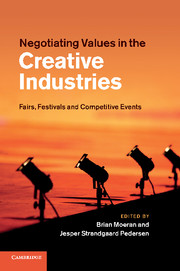Book contents
- Frontmatter
- Contents
- Figures
- Tables
- Contributors
- Acknowledgements
- Introduction
- 1 A Salon’s life
- 2 Art fairs
- 3 Biennalization and its discontents
- 4 Staging auctions
- 5 The book fair as a tournament of values
- 6 Inventing universal television
- 7 Transforming film product identities
- 8 Event institutionalization and maintenance
- 9 Tradition and transformation at the Fan Fair festival
- 10 Between art and commerce
- 11 Configuring sustainability at fashion week
- 12 An inconvenient truce
- 13 The retrospective use of tournament rituals in field configuration
- Afterword Converting values into other values
- Author index
- Subject index
- References
7 - Transforming film product identities
the status effects of European premier film festivals, 1996–2005
Published online by Cambridge University Press: 25 October 2011
- Frontmatter
- Contents
- Figures
- Tables
- Contributors
- Acknowledgements
- Introduction
- 1 A Salon’s life
- 2 Art fairs
- 3 Biennalization and its discontents
- 4 Staging auctions
- 5 The book fair as a tournament of values
- 6 Inventing universal television
- 7 Transforming film product identities
- 8 Event institutionalization and maintenance
- 9 Tradition and transformation at the Fan Fair festival
- 10 Between art and commerce
- 11 Configuring sustainability at fashion week
- 12 An inconvenient truce
- 13 The retrospective use of tournament rituals in field configuration
- Afterword Converting values into other values
- Author index
- Subject index
- References
Summary
One of the most prolific avenues of research in organization theory in recent decades has been the organizational ecology approach (Hannan and Freeman, 1977; Carroll and Hannan, 2004), which views organizations as members of populations and describes the dynamics of those populations. Recent research within that paradigm has focused on the long neglected issue of organizational form, which is central to any conceptualization of organizations as similar enough to be classified into populations (Hannan et al., 2007; Hsu and Hannan, 2005). This has resulted in an ecological conception of identity for both firms and products that differs from past conceptions of identity and advances an understanding of forms in ecological research (Hsu and Hannan, 2005). According to this argument, identity inheres in expectations, assumptions and beliefs held by sets of relatively homogeneous actors called audiences, who can be internal or external to organizations. These beliefs among audience members are conceptualized as codes that constitute the default prescriptions for firms or products – for example identities – as defined by that specific audience (Hannan et al., 2007; Hsu and Hannan, 2005). Interestingly, although higher level – for instance, institutional – processes and occasions for interaction are invoked as mechanisms by which these audiences define and enforce their preferred prescriptions, field-level processes have been largely ignored in this literature. Our study addresses this gap by linking ecological identities, more specifically product identities, with field-level events.
The film industry has been a setting in which some of the first empirical studies of these issues have been conducted (Zuckerman et al., 2003; Hsu, 2006; Hsu et al., 2009). Despite the increasingly global nature of this industry in recent decades, however, these studies have focused exclusively on films produced in the US and the domestic US audience. We expand the domain of these studies by focusing on a sample of films produced across the globe and premiered at the three major European film festivals, respectively Berlin, Cannes and Venice. We do this not just to expand the application of the ecological conception of identity to new empirical settings, but also because it offers an important opportunity to examine collective processes that affect how audiences define and enforce identities. We share with several other chapters in this volume a focus on how the social processes at collective events, such as trade fairs (Skov and Meier, Chapter 11; Havens, Chapter 6; Moeran Chapter 5), London Fashion Week (Entwistle and Rocamora, Chapter 10), a French art certification establishment (Delacour and Leca, Chapter 1), the annual festival for animation (Rüling, Chapter 8), wine certification events (Anand, Chapter 13; Croidieu, Chapter 12), art biennials (Tang, Chapter 3), and music festivals (Lena, Chapter 9), help to shape markets for particular products. With specific respect to films festivals, Baumann (2001) argued that they played a crucial role in emphasizing artistic status rather than the purely commercial nature of films. In order to separate the role of festivals from the other processes (for example, reviews by critics and amateurs, advertising campaigns, placement into a large number of opening screens, choosing a holiday release and so on), we focus on the premier international film festivals of Berlin, Cannes and Venice. Since premier festivals, by definition, pass judgement on films, via nominations and artistic recognition in the form of awards, prior to their release to the public, they offer an opportunity to study the effect of these field-level judgements of films as precursors to market reception. By contrast, the effect of prizes and other judgements rendered after a film has been released, for instance the Academy Awards or Golden Globe Awards, cannot be seen as precursors to audience reception.
- Type
- Chapter
- Information
- Negotiating Values in the Creative IndustriesFairs, Festivals and Competitive Events, pp. 169 - 196Publisher: Cambridge University PressPrint publication year: 2011
References
- 16
- Cited by



